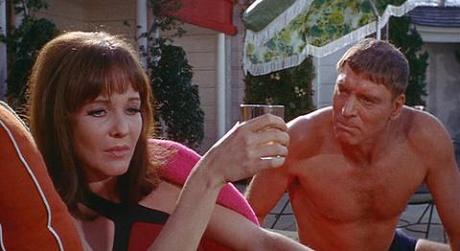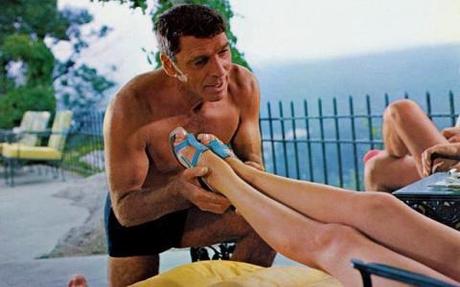
by Steve Habrat
At a quick glance, director Frank Perry’s surreal 1968 drama The Swimmer doesn’t jump out at you as a cult classic. When you watch the trailer, it swells with emotion as star Burt Lancaster proudly proclaims that he is going to swim home across a number of swimming pools that dot his scenic, upper class Connecticut suburb. Melodramatic music takes the wheel as the handsome Lancaster flirts with a number of beautiful socialite women, races a horse, and yellow on-screen text asks, “When you talk about The Swimmer, will you talk about yourself?” On the surface, it doesn’t seem like the type of film that would fit into the cult classic mold—a mold that was constructed over time by B-movie cheapies, ultra-violent midnight movies, grindhouse filler, and quirky failures. In all honesty, it seems like the type of movie your mother would love. However, when you dive deep into The Swimmer, you realize that the film, which was based upon a shot story by John Cheever, is a haunting tragedy dressed up in studio-drama garb. Led by an unforgettable performance by Lancaster, this overlooked gem is a film unlike any other—a strange, moody experience that slowly evolves from a sunny daydream into a stormy nightmare.
The Swimmer introduces us to Ned Merrill (played by Burt Lancaster), a charismatic and seemingly well-off advertising executive who unexpectedly appears in an old friend’s manicured back yard. Wearing nothing but a pair of navy blue swimming trunks, Ned is met with handshakes, smiles, and warm welcomes from all sitting around the pool. While peering out across the backyard, Ned realizes that there is a river of swimming pools that lead right to his own home, and he is suddenly compelled to swim the entire way home. Dubbing the river of swimming pools the “Lucinda River” after his often-mentioned but never-seen wife, Ned embarks on a journey that takes him to the homes of several old friends and acquaintances, all of which react to Ned’s sudden appearance in drastically different manners. Upon his journey, he reconnects with a young babysitter, Julie Ann Hooper (played by Janet Langard), who had developed a crush on Ned while watching his daughters, and Shirley Abbott (played by Janice Rule), a cold stage actress whom Ned had shared a brief fling with. Yet as Ned gets closer and closer to home, he realizes that several of his relationships and his lavish lifestyle may not be as sunny as they appear.
Early on, very little is overly strange or surreal about The Swimmer, the only peculiar things being Ned’s sudden appearance and his reluctance to reveal what he has recently been up to. He masks this unwillingness to speak about the present by offering up suave charms that tickle his old friends nursing hangovers by the pool. Upon getting the idea to swim home to his family, The Swimmer becomes increasingly moody, constantly bouncing between warm, sunny, charming, romantic, uncomfortable, psychedelic, and spontaneous before cowering down underneath gathering storm clouds in the final half hour. This constant shift in tone makes The Swimmer an incredibly unpredictable drama, as old friends and acquaintances welcome Ned with increasingly mixed reactions. Some people are icy and instantly order Ned off their property, while others are a bit uneasy with him dropping by. One encounter is fairly romantic, but it ends in squirm inducing rejection that leaves an emotionally wounded Ned limping off towards his next pool to dive into. One of the most stinging encounters comes when Ned meets up with Shirley Abbott, a woman Ned had a fling with many years earlier. Where once Ned’s playful flirtations were met with giggles and smiles, now they are met with put downs and the admittance that Shirley never enjoyed her intimate moments with Ned. Watching Shirley kill off what’s left of Ned’s cool optimism is immensely painful, ending with a venomous sting that leaves our bathing suit clad protagonist shivering in the dying sun. (This emotional encounter with Janice was actually ghost directed by newcomer Sydney Pollack.)

Aiding with The Swimmer’s shattering power is Burt Lancaster, who gives a mesmeric performance as Ned, the mystifying advertising executive on a mission to swim his way home. While Eleanor Perry’s script almost paints Ned as an apparition who just suddenly materializes from the nearby woods, Lancaster really pivots around all the emotions like the graceful professional that he was, using his massively expressive, baby-blue eyes to really emit Ned’s early wonder and his final soul-shaking trauma. He also draws from his career as an acrobat, leaping, jumping, and playing with Julie in a horse pen like a couple of invincible school children who believe they are capable of anything and everything. And then there are the small touches, especially near the end when Ned is growing weary on his journey. His face is drooping into exhaustion and emotional defeat as he begs his way in to a public pool and limps his way through the rusted gate that guards his mansion. In the supporting roles, Langard’s Julie is a young, naïve sunbeam who has yet to experience the sadness and disappointment that Ned has encountered. She rambles on about silly school girl crushes that she hid just years before, and sheepishly admits that she stole one of Ned’s shirts one evening while she babysat his daughters. Janice Rule’s Shirley is like a viper lying out in the sun, one that Ned tramples on with his bare feet and ends up with her venom pumping into his exposed ankles.
Since The Swimmer offers very little about Ned’s background, the viewer is left to piece together his rocky past through his swim across the “Lucinda River.” As far as one can tell, life started out great for Ned—a man with a great career, a loving family, a slew of friends, and a lavish lifestyle in the sun. Behind his wife’s back, he carried out flings and affairs that ended with broken hearts, and he wronged several of his friends, leaving them seething with bitter hatred. As relationships fizzled, so did Ned’s lavish lifestyle, as money problems struck the Merrill household, his daughters ran rampant through the neighborhood, and his wife’s elitist personality left many acquaintances sour. This all added up to tragedy and ruin for the swimmer, as he crawls his way through an early fall thunderstorm for a place to rest his aching bones. As far as the technical aspects of The Swimmer go, the film’s cinematography looks beautiful and radiant, and the score from Marvin Hamlisch is a rush of melodramatic strings that compliment Ned’s successes and failures in suburbia. Overall, The Swimmer is a unique work of art that can be interpreted many different ways. No matter how you choose to look at it, Perry’s film will haunt every inch of your brain long after you’ve walked away from it. It’s a true one-of-a-kind masterpiece.
Grade: A+
The Swimmer is available on Blu-ray and DVD.
